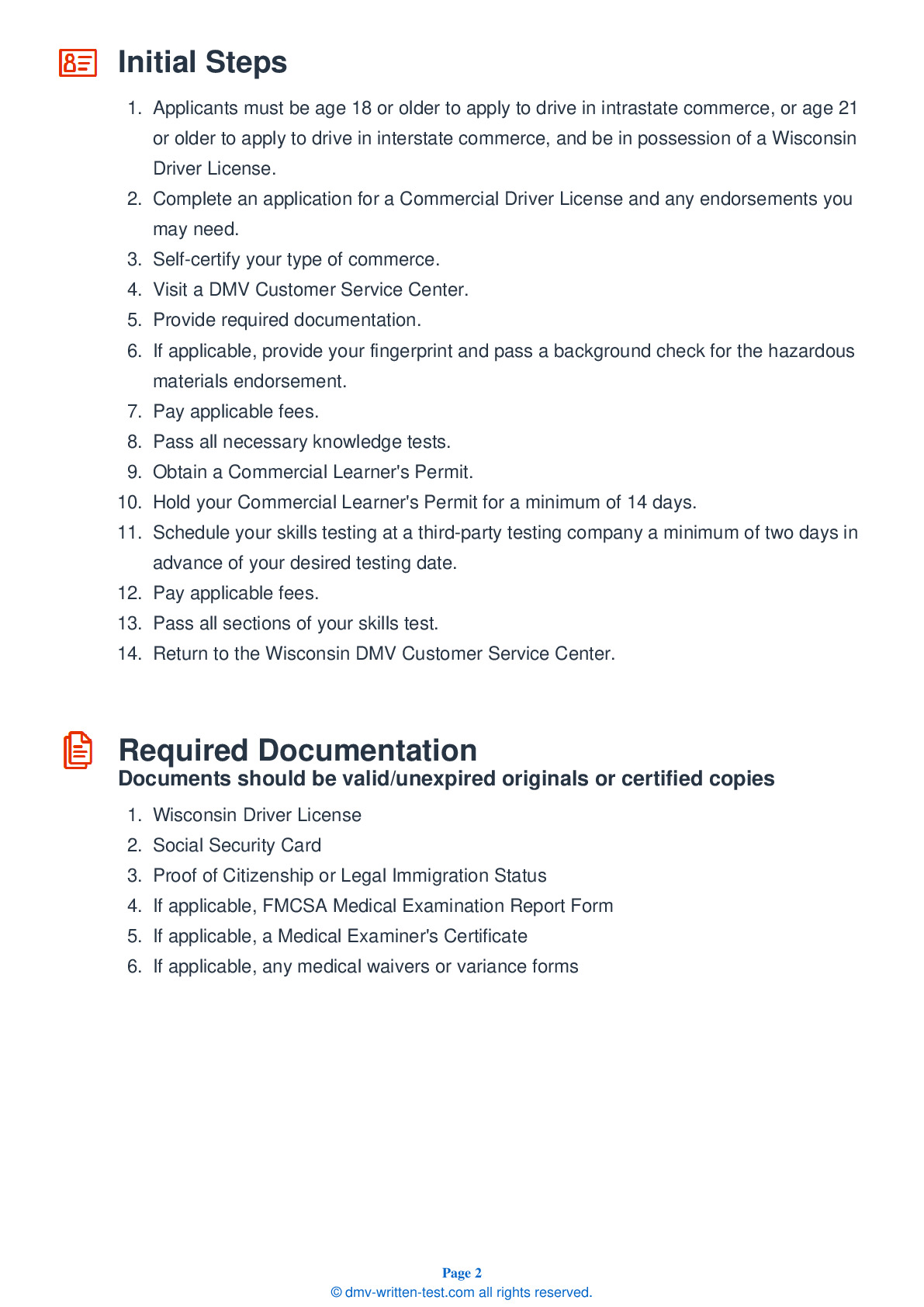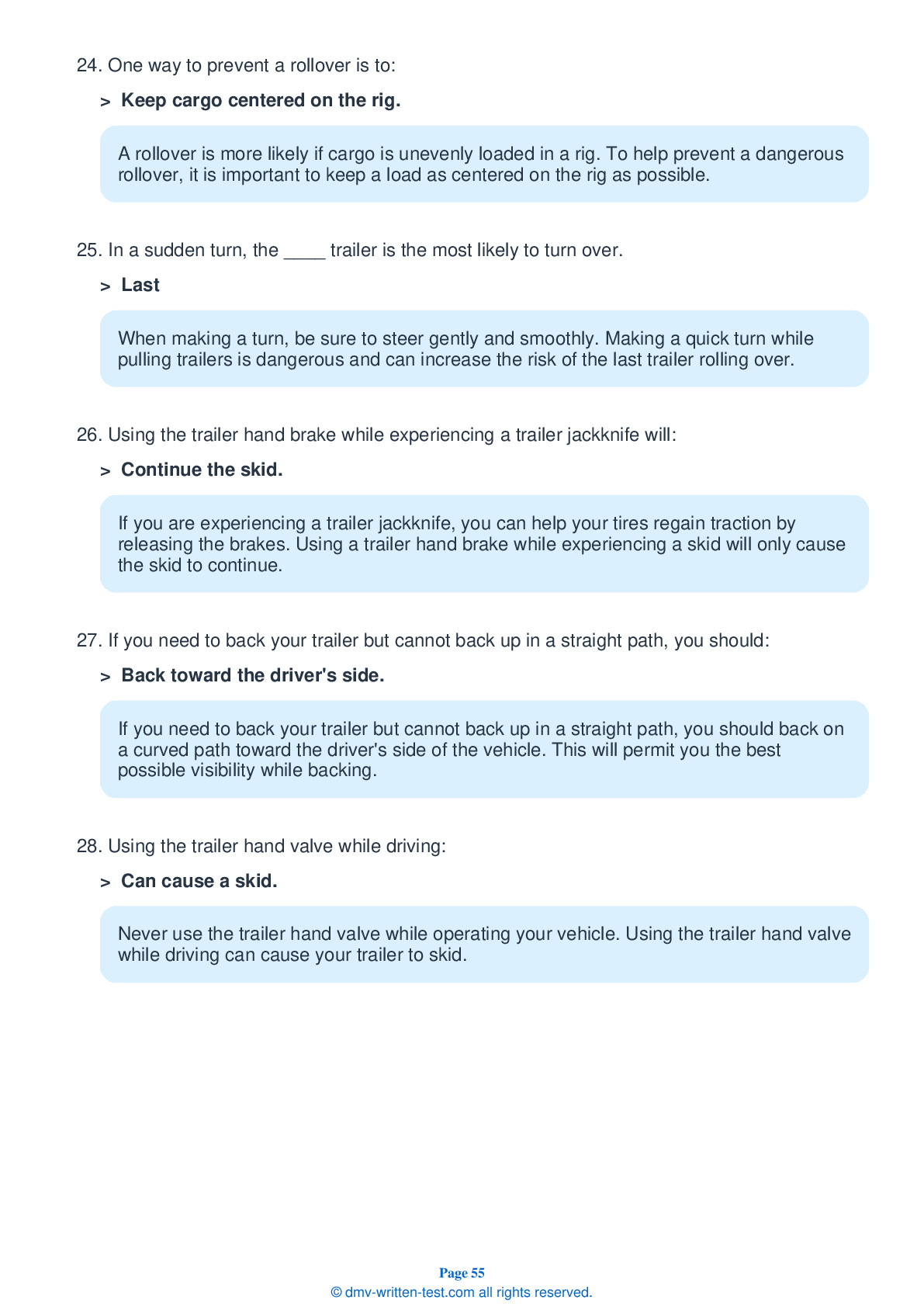Knowledge Test Class B
This license is required for driving a single vehicle with a GVWR of more than 26,001 pounds, and a trailer not to exceed 10,000 pounds gross vehicle weight rating, or a vehicle designed to transport 24 or more people (including the driver). To receive this license, applicants must pass a 50-question test. To pass, applicants must answer 40 questions correctly. Each question has three or four possible answer choices. Test questions come from the Wisconsin Commercial Driver’s Manual. Questions come from chapters covering: Introduction, Driving Safely, Transporting Cargo Safely, Air Brakes (if applicable), Combination Vehicles and Hazardous Maerials. Endorsements that may be used with a Class B CDL are: Hazardous materials, Tank, Passenger, HazMat and Tank, Air Brakes and School bus.
8. Which of the following is a good rule to follow when making a turn?
Signal well in advance of a turn so drivers behind you are aware of your intentions. Keep the signal on throughout the turn and turn it off once the turn is complete.
9. When asked to make a lane change during the driving test, you should:
You will be asked to change lanes during the on-road driving test. When the examiner asks you to do this, you should make the necessary traffic checks and use the proper signals before changing lanes.
10. If you are unsure if there is enough space for your vehicle to safely travel under a bridge, you should:
If you aren't sure that you have space for your vehicle to safely fit underneath an overhead object, slow down and seek an alternate route if possible.
11. If a driver begins to feel fatigued while driving, they should:
If you begin to feel drowsy while driving, the only safe response is to safely leave the road and get some sleep. Using artificial stimulants can be dangerous because they may cause extreme fatigue when they begin to wear off.
12. When completing an offset back/left parking maneuver, a driver should:
If you are asked to complete an offset back/left parking maneuver, you should first pull straight forward, then back up to the left. Your vehicle must be parked completely within the boundaries of the parking space.
13. Most drivers are the least alert:
Fatigue and lack of alertness are major hazards when driving at night. Most people are the least alert at night, especially after midnight.
14. When crossing railroad tracks, you should:
When crossing railroad tracks during the on-road driving skills test, you must not stop, change gears, pass another vehicle, or change lanes while any part of your vehicle is in the railroad crossing.
Frequently Asked Questions
To obtain a Class B CDL in Wisconsin, you must:
1. Be at least 18 years old to drive within the state or 21 years old to drive interstate.
2. Possess a valid Wisconsin driver's license.
3. Pass a medical examination and obtain a medical certificate.
4. Obtain a learner's permit by passing the appropriate written tests.
5. Pass the skills test, which includes a pre-trip inspection, basic vehicle control test, and on-road driving test.
It is important to note that there may be additional requirements based on the type of vehicle you will be driving and the nature of your work. Additionally, CDL holders are subject to more stringent regulations regarding driving time and rest periods than non-commercial drivers.
1. Straight trucks (e.g., delivery trucks, dump trucks)
2. Buses (e.g., city buses, school buses)
3. Box trucks with attached trailers
4. Tractor-trailers with a single trailer
5. Large passenger vans (e.g., airport shuttles)
It's important to note that there may be additional endorsements required for certain types of vehicles, such as hazardous materials or passenger endorsements for buses and large vans. Additionally, some employers may have additional requirements beyond what is required by the state to operate certain types of vehicles.
1. Be at least 18 years old to drive within the state or 21 years old to drive interstate.
2. Possess a valid Wisconsin driver's license.
3. Provide proof of U.S. citizenship or lawful permanent residency.
4. Submit a medical examination report and obtain a medical certificate from a licensed medical examiner.
5. Pass a vision test.
6. Pass the written knowledge test for the Class B CDL, which covers topics such as vehicle inspection, basic control skills, and safe driving practices.
7. Obtain a commercial learner's permit (CLP) by passing the appropriate written tests.
8. Complete behind-the-wheel training with a qualified instructor or employer.
9. Pass the skills test, which includes a pre-trip inspection, basic vehicle control test, and on-road driving test.
Additionally, there may be additional requirements for specific endorsements, such as hazardous materials or passenger endorsements for certain types of vehicles.
It's important to note that the process of obtaining a CDL can be time-consuming and require significant preparation and training. It is recommended to thoroughly study the Wisconsin Commercial Driver's Manual and seek out reputable training programs to ensure success in obtaining your CDL.
It's important to note that some employers may have age requirements beyond what is required by the state for certain types of vehicles or job positions. Additionally, certain endorsements may have additional age requirements, such as hazardous materials or passenger endorsements for buses and large vans.
Below are the types of endorsements that may be required for a Class B CDL:
1. Passenger endorsement (P) - Required if you plan to transport 16 or more passengers (including the driver) in a single vehicle.
2. School bus endorsement (S) - Required if you plan to drive a school bus with passengers, which includes school children.
3. Tanker endorsement (N) - Required if you plan to transport liquids or gases in bulk containers with a capacity of 1,000 gallons or more.
4. Hazardous materials endorsement (H) - Required if you plan to transport hazardous materials, which are defined as any substance or material that has been determined by the Secretary of Transportation to be capable of posing an unreasonable risk to health, safety, and property when transported in commerce.
5. Combination Tanker/Hazmat endorsement (X) - Required if you plan to transport both hazardous materials and liquids or gases in bulk containers with a capacity of 1,000 gallons or more.
It's important to note that each endorsement requires passing a separate written test and may also require additional training and background checks.
1. Pre-Trip Inspection: You will be asked to perform a pre-trip inspection of your vehicle. This includes checking the vehicle's brakes, tires, lights, steering, suspension, and other important components to ensure that the vehicle is safe to operate.
2. Basic Vehicle Control: You will be asked to demonstrate your ability to control the vehicle in a controlled environment. This includes tasks such as straight-line backing, offset backing, and parallel parking.
3. Road Test: You will be asked to demonstrate your ability to operate the vehicle in normal traffic situations. This includes driving on the road, making turns, changing lanes, and other maneuvers.
During the skills test, you will be evaluated on your ability to safely and effectively operate the vehicle and follow standard procedures. It's important to study and practice these skills before taking the test to ensure that you are fully prepared.
Additionally, if you plan on getting any endorsements for your Class B CDL (such as passenger or hazardous materials), you will also need to pass additional written and/or skills tests specific to those endorsements.
1. Vehicle weight: A driver with a Class B CDL is allowed to operate vehicles with a gross vehicle weight rating (GVWR) of 26,001 pounds or more, but is not permitted to tow a vehicle with a GVWR of more than 10,000 pounds.
2. Passenger limits: If the driver has a passenger endorsement on their CDL, they are limited to carrying 16 or more passengers (including the driver). However, if the driver does not have a passenger endorsement, they are limited to carrying no more than 10 passengers.
3. Hazardous materials: If the driver has a hazardous materials endorsement on their CDL, they must follow strict rules and regulations for transporting hazardous materials, including special training and safety requirements.
4. State-specific restrictions: Some states may have additional restrictions or requirements for Class B CDL drivers beyond those set by the federal government. It's important for drivers to check with their state's Department of Transportation for any additional rules or regulations that may apply.
It's important for Class B CDL drivers to be aware of these restrictions and limitations in order to operate their vehicles safely and legally on the roads.
If your state offers the Class B CDL written test in another language, you will need to contact your local Department of Motor Vehicles (DMV) or Department of Transportation (DOT) to find out what languages are available and what the requirements are for taking the test in another language.
In some cases, you may need to provide your own interpreter or pay an additional fee for a test in another language. It's important to check with your local DMV or DOT for specific requirements and procedures.
Under the Americans with Disabilities Act (ADA), individuals with disabilities are entitled to reasonable accommodations during the testing process. Reasonable accommodations may include things such as extra time, a reader, or a sign language interpreter.
To request accommodations for the Class B CDL written test, you will need to contact your local DMV or DOT and provide documentation of your disability and your need for accommodations. The DMV or DOT will then work with you to determine what accommodations are necessary and how they can be provided.
It's important to note that the process for requesting accommodations may vary by state, so it's best to contact your local DMV or DOT for specific information on how to request accommodations for the Class B CDL written test.
In most cases, you will need to wait a certain amount of time before you can retake the test. The waiting period may vary depending on your state, but it's usually between one and two weeks.
In addition, you may be required to pay a fee each time you retake the test. The fee amount may vary depending on your state, but it's typically around $10-$25 per retake.
It's important to note that if you fail the test multiple times, you may be required to complete additional training or education before you can retake the test again. This is to ensure that you have a better understanding of the material before taking the test again.
Overall, if you fail the Class B CDL written test, don't worry too much. You will likely be allowed to retake the test after a short waiting period and with additional preparation, you can increase your chances of passing.




